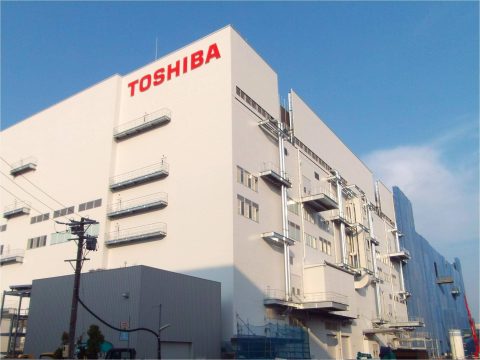The sell-off is part of Toshiba's corporate restructuring plan aimed at revitalizing its ever-deteriorating profitability in the aftermath of the scandal of its rigged corporate accounting practice.
Toshiba will retain its still lucrative NAND flash memory chip business, however, focusing more of its financial resources on the non-volatile memory chip businesses.
Toshiba ranks as the world's second largest NAND flash memory chip maker by market share following world's leader Samsung Electronics. NAND flash memory chip are widely used in computer storage systems like SSD, solid state drive and smart USB cards.
As IT companies across the world are investing heavily in their data center and cloud computing system for Big Data Analytics, demand for SSDs are on the rise, rapidly replacing HDDs. So does demand for NAND flash memory chips, the most crucial building block for SSDs.

Along with the nuclear power equipment business, Toshiba is positioning the memory chip business as one of its two key business pillars- driving force to get the money-losing company back on track.
The sell-off list includes analog chips, power management ICs, and MCUs for industrial and automotive markets as well as consumer electronics.
Toshiba is already in talks with Sony to sell its CMOS image sensor chip business, while the chip maker had already pulled out of the loss-making LED business.
All combined, the non-memory chip business on the sell-off list used to generate 200 billion yen annually on average. As with the case, Toshiba hopes to sell the non-memory chip business for somewhere near what amounts to the annual revenues combined
The chip maker plans to plough the money back into the memory chip business to build up new NAND flash memory chip capacity, especially for 3D NAND flash memory chips.
Toshiba is scheduled to start volume production of 3D NAND flash memory chips sometime in March.
The mass rollout of 3D NAND flash memory chip is expected to accelerate the adoption of SSDs into the data center server market, as the vertically stacked NAND flash memory chips would give much-needed price affordability and long durability.
SSDs are a collection of NAND flash memory chip, memory controller and firmware on a circuit board. Vertically stacking memory cells give a lot roomier space for cramming more cells into given space, compared with the conventional 2D planar NAND flash memory chips, allowing the chip makers to cut unit price further. It will also guarantee long durability and reliability.

